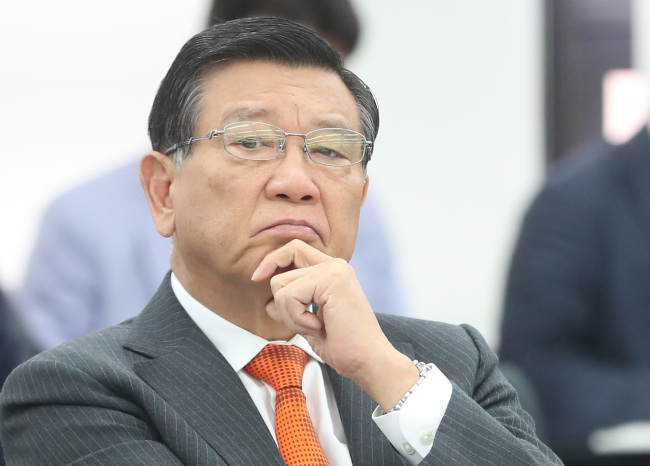The fate of Kumho Tire, the nation’s second-largest tiremaker, hangs in the balance as Kumho Asiana Chairman Park Sam-koo has prepared a management plan to be submitted to creditors on Tuesday to persuade them to keep him on board as top brass, and to open another opportunity to buy back the beleaguered tire company.
Creditors of the tire company led by Korea Development Bank have asked Park to submit a proposal to revive the flailing finances of the tire company, which saw a 50.7 billion won ($44.8 million) loss in operating profits in the first half of 2017. If his proposal is not accepted, the creditors could remove Park and other top executives at the tire unit.
Losing management leadership over Kumho Tire would be disastrous for the Kumho Asiana chief, who lost ownership of the tire unit in 2010 as part of a debt restructuring deal. Kumho Tire had paid dearly for Kumho Group’s acquisition of shares in Daewoo Engineering and Construction, as well as building new plants.
 |
Park Sam-koo, chairman of Kumho Asiana Group (Yonhap) |
The main issue is Kumho Tire’s debts totaling nearly 1.6 trillion won, which are scheduled for repayment starting at the end of September through to the end of the year. To keep Kumho Tire afloat, creditors are expected to pour 400 billion to 410 billion won of additional funds into the company.
Industry analysts expect that Park will be basing his proposal on measures that he has considered in the past, including selling Kumho Asiana‘s stake in Daewoo, issuing new shares to raise approximately 200 billion won and selling the money-losing China plant.
Park has also told reporters that he is “considering all options including selling the Chinese business of the unit.” Kumho Asiana has declined to comment on its planned proposal.
Although suffering from fallout from intergovernmental tensions between Korea and China that led to a sharp drop in orders for Korean automakers operating in China, Kumho Tire remains one of the most profitable units of the group, which operates Asiana Airlines. Park has said publicly and repeatedly that he aspires to buy back Kumho to reconstruct his empire.
The original restructuring deal had included giving Park the right of first refusal if and when creditors decide to sell the unit. In March this year, creditors decided to sell a 42 percent controlling stake in Kumho Tire to Chinese tiremaker Qingdao Doublestar. At the time, the creditors disallowed Park from forming his own consortium to fund the purchase, preventing Park from exercising his right to first refusal.
However, after the stock purchase agreement, Kumho Tire’s profitability dropped sharply in the first half of the year, leading Doublestar to ask for a significant price cut and sending creditors into renegotiations. On Sept. 8, creditors sent Doublestar an official proposal to nullify the agreement. If the original contract is void, Park has another opportunity to buy back the tire unit.
Doublestar declined to comment on whether it plans to sign the nullification agreement.
The struggles of Kumho Tire could be seen as a double-edged sword, driving down the market price of the company for Park’s reattempt at buying back the unit.
The political climate surrounding the sale has also shifted since Park‘s last attempt, giving him a rosier outlook. The new administration’s focus on maintaining job security puts pressure on creditors to sway their decisions towards measures to normalize management at Kumho Tire rather than turning it over to court receivership and leading to potential layoffs.
Last week, Industry Minister Paik Un-gyu also made an unusual public comment saying that allowing Park to form a consortium would be the best option for Kumho Tire, signaling that the administration would favor a buyback by Park over a renegotiated deal with Doublestar.
By Won Ho-jung (
hjwon@heraldcorp.com)







![[Today’s K-pop] Blackpink’s Jennie, Lisa invited to Coachella as solo acts](http://res.heraldm.com/phpwas/restmb_idxmake.php?idx=644&simg=/content/image/2024/11/21/20241121050099_0.jpg)
